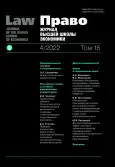Impact of Current International Migration on the Legal and Regulatory Framework for Migration Management in the Russian Federation
- Authors: Amelchakov I.1, Kataeva O.1
-
Affiliations:
- Putilin Belgorod Law Institute of Interior Ministry
- Issue: Vol 15, No 4 (2022)
- Pages: 112-135
- Section: Russian Law: Condition, Perspectives, Commentaries
- URL: https://journal-vniispk.ru/2072-8166/article/view/318206
- DOI: https://doi.org/10.17323/2072-8166.2022.4.112.135
- ID: 318206
Cite item
Full Text
Abstract
About the authors
Igor Amelchakov
Putilin Belgorod Law Institute of Interior Ministry
Email: noreply@hse.ru
ORCID iD: 0000-0002-7232-9492
Candidate of Sciences (Law), Associate Professor
Olga Kataeva
Putilin Belgorod Law Institute of Interior Ministry
Email: noreply@hse.ru
ORCID iD: 0000-0002-9066-2424
Candidate of Sciences (Law), Associate Professor
References
- Alekseeva G.I., Prizhennikova A.N. (2014) Labor migration in Russia: legal and accounting aspects. Bukhgalterskii uchet v byudzhetnykh i nekommercheskikh organi-zatsiyakh=Accounting in budgetary and non-profit organizations, no. 22, pp. 33-42 (in Russ.)
- Andrichenko L.V. (2011) Attracting foreign professionals to work in Russia. Zhurnal rossiyskogo prava=Journal of Russian Law, no. 7, pp. 5-16 (in Russ.)
- Baksheeva Yu. N. (2013) Regulation of attracting foreign professionals for work in the Russia. Migratsionnoe pravo=Migration Law, no. 4, pp. 15-21 (in Russ.)
- Bertrand K. (2014) Paradoxes of the immigration policy of the European Union. Lex Russica, no. 4, pp. 485-492 (in Russ.)
- Bodurova G.G., Aminova F.M. (2020) Role of migration in the modern world. Migratsionnoe pravo=Migration Law, no. 3, pp. 31-35 (in Russ.) DOI:https://doi.org/10.18572/2071-1182-2020-3-31-35
- Bulatov R.B., Andreitso S. Yu. (2021) Realizing of foreign citizens rights in Russia: forced migration, administrative responsibility. Migratsionnoe pravo=Migration Law, no. 1, pp. 7-10 (in Russ.) DOI:https://doi.org/10.18572/2071-1182-2021-1-7-10
- Degtyareva L.N., Dudin N.M. (2019) Migration legislation: constitutional and legal analysis. Gosudarstvennaya vlast' i mestnoe samoupravlenie=State Power and Local Self-Government, no. 6, pp. 32-34 (in Russ.) DOI:https://doi.org/10.18572/1813-1247-2019-6-32-34
- Egorov S.A. (ed.) (2015) International law. Moscow: Statut, 848 p. (in Russ.)
- Fedoseev A.I. (2013) Application of international law norms in cases related to restriction of rights of foreign citizens. Migratsionnoe pravo=Migration Law, no. 4, pp. 35-37 (in Russ.)
- Gafurov Ya. M. (2016) Development of Russian legal environment in the context of globalization. Bezopasnost' biznesa=Business Security, no. 2, pp. 19-24 (in Russ.)
- Golubtsov V.G., Kuznetsova O.A. (ed.) (2016) Sixth Perm Congress of Lawyers: selected materials. Moscow: Statut, 448 p. (in Russ.)
- Gorokhova S.S. (2016) Novelties of legislation on entry and exit from the Russian Federation. Sovremennyi yurist=Modern Lawyer, no. 1, pp. 62-71 (in Russ.)
- Ilesanmi M.A. (2018) Pandemics and human rights restrictions. Yurist=Lawyer, no. 8, pp. 59-65 (in Russ.) DOI:https://doi.org/10.18572/1812-3929-2018-8-59-65
- Kapinus O.S. (2016) llegal migration as threat to Russia's national security. Migratsionnoe pravo=Migration Law, no. 1, pp. 29-33 (in Russ.)
- Karpovich O.G. (2015) The place and role of Russia in the world: challenges and risks. Mezhdunarodnoe chastnoe i publichnoe pravo=International Public and Private Law, no. 1, pp. 11-15 (in Russ.)
- Kazaryan K.V. (2018) Migration amnesty as a type of administrative amnesty. Migratsionnoe pravo=Migration Law, no. 3, pp. 37-39 (in Russ.)
- Kozlov V.F., Lukyanov A.S. (2015) Consolidation of national legislation in combating illegal migration. Rossiiskaya yustitsiya=Russian Justice, no. 3, pp. 22-25 (in Russ.)
- Krasnova K.A., Sibagatullina E.T. (2011) The role of migration legislation in strengthening sovereignty and public security of the Russian Federation. Migratsionnoe pravo=Migration Law, no. 3, pp. 6-9 (in Russ.)
- Lukashuk I.I. (2000) Globalization, state, law, 21 century. Moscow: Statut, 279 p. (in Russ.)
- Mukomel V.I. (2012) Transformation of migration flows: circular migrations. Migratsionnoe pravo=Migration Law, no. 3, pp. 28-33 (in Russ.)
- Nikitenko I.V. (2013) Migration security of Russia (criminological aspect). Moscow: Shumilova, pp. 93-94 (in Russ.)
- Ostroumov N.N. (2015) Unification of private international law. Zhurnal rossiyskogo prava=Journal of Russian Law, no. 1, pp. 140-143 (in Russ.)
- Petrovskaya M.I. (2015) Policy of forced migration. Leningradskii yuridicheskii zhurnal=Leningrad Law Journal, no. 3, pp. 211-221 (in Russ.)
- Petrovskaya M.I. (2021) The forced migration in Russia: administrative and legal aspect. Yurist=Lawyer, no. 1, pp. 44-53 (in Russ.)
- Prosyannikova T.S. (2013) Integration of migrants. Migratsionnoe pravo=Migration Law, no. 4, pp. 12-16 (in Russ.)
- Prudnikov A.S., Akimova S.A. (2013) Illegal migration and administrative and legal responsibility for offenses in the field. Lex Russica, no. 9, pp. 953-960 (in Russ.)
- Savelyeva M.V. (2016) Application of administrative punishment in the form of administrative expulsion of a foreign citizen or a stateless person from Russia. Migratsionnoe pravo=Migration Law, no. 1, pp. 18-21 (in Russ.)
- Semenova A.V. (2016) Migration security of Russia. Administrativnoe pravo i protsess=Administrative Law and Process, no. 2, pp. 40-42 (in Russ.)
- Skorobogatova V.I. (2015) Migrant integration: which model is best for Russia? Migratsionnoe pravo=Migration law, no. 4, pp. 5-7 (in Russ.)
- Stepanov A.V. (2013) Illegal migration as a threat to the national security of Russia: concept, content, directions of counteraction. Administrativnoe pravo i protsess=Administrative Law and Process, no. 8, pp. 20-23 (in Russ.)
- Trykanova S.A. (2015) The relevance of improving interdepartmental interaction of federal law enforcement bodies with municipalities in the fight against illegal migration. Migratsionnoe pravo=Migration Law, no. 2, pp. 22-24 (in Russ.)
- Tyutyunnik I.G. (2017) Selfish motive in structure of crimes against personal freedom: criminal law and criminological analysis. Moscow: Justitcinform, 152 p. (in Russ.)
- Veliaminov G.M. (2015) International law: essays. Moscow: Statute, 1006 p. (in Russ.)
- Vlasov I.S., Golovanova N.A. et al. (2012) Migration and crime: comparative legal analysis. Moscow: Kontrakt, 496 p. (in Russ.)
- Vorobyova O.D. et al. (2021) Labor resources and migration policy. Migratsionnoe pravo=Migration Law, no. 2, pp. 21-25 (in Russ.)
- Voronov A.M., Sandugei A.N. (2020) System issues of state administration of migration. Administrativnoe pravo i protsess=Administrative Law and Process, no. 11, pp. 52-56 (in Russ.)
- Yakovleva L.V. (2016) Integration processes in normative support of criminal proceedings under the influence of globalization. Mezhdunarodnoe ugolovnoe pravo i mezhdunarodnaya yustitsiya=International Criminal Law and International Justice, no. 3, pp. 3-6 (in Russ.)
- Yastrebov O.A., Parfentieva A.E. (2016) Trends of globalization and international administrative law. Yurist=Lawyer, no. 15, pp. 32-36 (in Russ.)
Supplementary files








